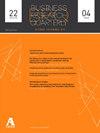Where smart meets sustainability: The role of Smart Governance in achieving the Sustainable Development Goals in cities
IF 3.4
4区 管理学
Q2 BUSINESS
引用次数: 12
Abstract
Sustainable Development Goals (SDGs) seek to achieve economic, social, and environmental progress globally. However, trade-offs among these three pillars might occur, particularly in the context of cities. We argue that these trade-offs exist because the traditional factors of production for economic welfare are not always relevant to the other dimensions of city sustainability. Consequently, additional factors are needed to facilitate the progress of the 2030 agenda. We make a case for smart governance, a factor that we associate with the quality of governance. We explore these ideas by examining the economic, social, and environmental dimensions of 128 cities worldwide. Our results indicate that the traditional factors of production (labor, land, and capital) are positively associated with the economic dimension but weakly associated with the social and environmental dimensions. However, smart governance is positively associated with the various dimensions of urban sustainability. JEL CLASSIFICATION: Q01; Q28; Q53; Q56; O18; Z13智慧与可持续:智慧治理在实现城市可持续发展目标中的作用
可持续发展目标旨在实现全球经济、社会和环境进步。然而,这三大支柱之间可能会发生权衡,特别是在城市的背景下。我们认为,存在这些权衡是因为经济福利的传统生产要素并不总是与城市可持续性的其他维度相关。因此,需要更多的因素来推动2030年议程的进展。我们提出了明智治理的理由,这是我们将其与治理质量联系在一起的一个因素。我们通过考察全球128个城市的经济、社会和环境维度来探索这些想法。我们的研究结果表明,传统生产要素(劳动力、土地和资本)与经济维度呈正相关,但与社会和环境维度弱相关。然而,智慧治理与城市可持续性的各个层面正相关。JEL分类:Q01;Q28;Q53;Q56;O18;Z13
本文章由计算机程序翻译,如有差异,请以英文原文为准。
求助全文
约1分钟内获得全文
求助全文

 求助内容:
求助内容: 应助结果提醒方式:
应助结果提醒方式:


